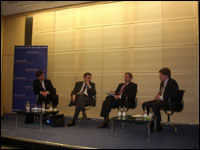Registration
You will receive an email confirming your registration.
IMGXYZ862IMGZYXIn the wake of the December 2007 U.S. National Intelligence Estimate (NIE) on Iran and the February 2008 report by the International Atomic Energy Agency (IAEA), some fundamental questions remain on Iran’s nuclear intentions and capabilities and the options facing the international community. On March 11, 2008, Carnegie Europe hosted a high-level panel in Berlin, Germany, to discuss future strategies for dealing with Iran’s nuclear ambitions.
Carnegie’s Pierre Goldschmidt provided commentary on the IAEA’s report on Iran to the UN Security Council, and George Perkovich shared his analysis on how the NIE has affected U.S. policy options vis-à-vis Iran. They were joined by Eckart Von Klaeden, Foreign Affairs Speaker of the CDU/CSU Parliamentary Group of the German Parliament, who shared his insights on the German perspectives on nuclear Iran. The panel was chaired by Dr. Volker Perthes, Director of the German Institute for International and Security Affairs (SWP).
